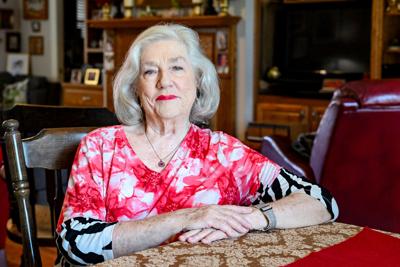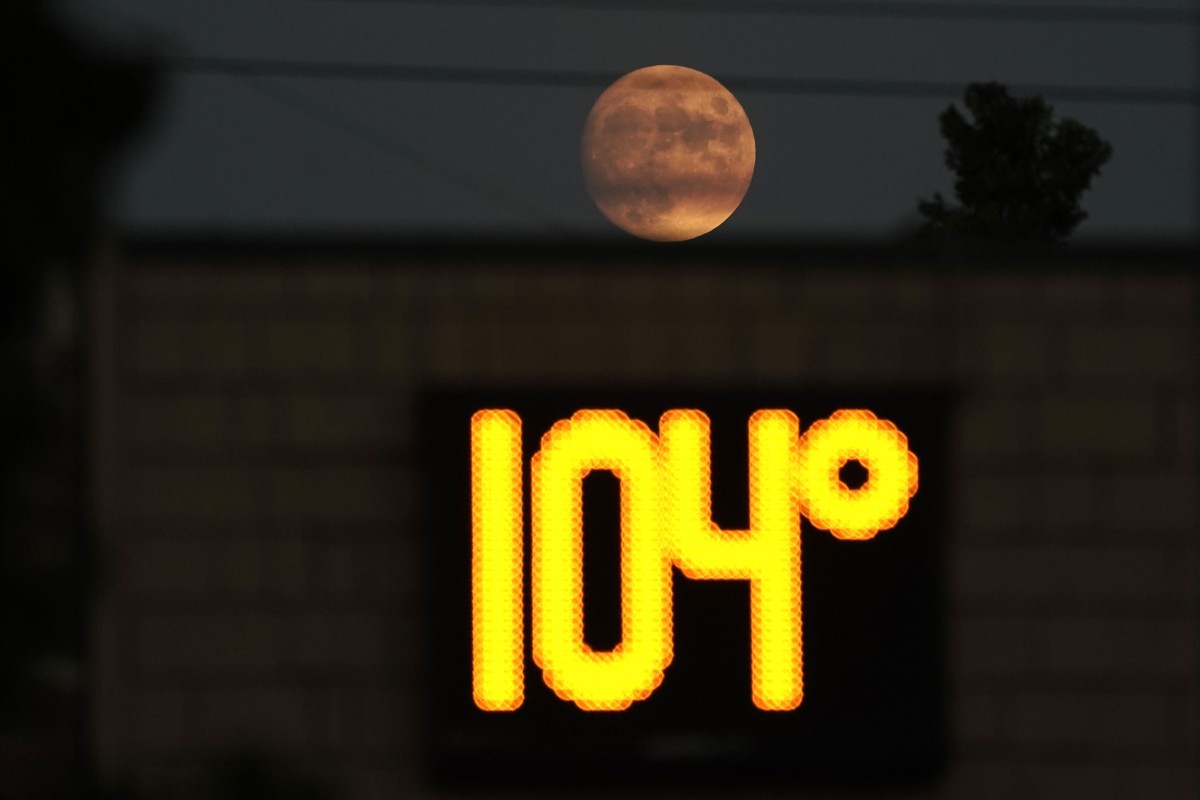About three decades ago, a 54-year-old mother of 10 in Prairieville opened her local newspaper and saw a notice about a diabetes study starting at Pennington Biomedical Center in Baton Rouge, about 16 miles down the road.
A finger-prick test revealed her blood sugar was just under the cutoff. But two weeks later, she got a call: The study was expanding eligibility. Although only prediabetic, she was in.
“I was so excited,” Donna Braud recalled. A former teacher, she signed up to “do something for society, promote a scientific thing.”

Donna Braud shows off a blanket she received from the Diabetes Prevention Program Outcomes Study in her Prairieville home on Thursday, June 19, 2025. The study was canceled by the Trump administration.
Javier GallegosFor the next 30 years, she gave blood, took memory tests, kept food logs and underwent dozens of scans in what became known as the Diabetes Prevention Program Outcomes Study. She eventually developed diabetes, but the program taught her how to live with it, said Braud, now 82.
When Pennington staff called this year to say the study had lost its federal funding and was ending, Braud was devastated. “I felt denied,” she said. “I did everything they asked. I went to every meeting, I went to every test. I did all the paperwork. I never missed anything.”
The Trump administration’s abrupt shift in federal funding has reached into Louisiana’s research institutions, stalling or terminating studies on infectious disease, reproductive health, HIV and chronic disease. While much attention has focused on canceled grants at high-profile universities who have publicly pushed back on ideological interference and cuts, researchers in Louisiana say the damage here is just as severe, and often harder to track. Subawards tied to larger institutions have dried up, renewals are in limbo and labs have begun cutting staff.

Donna Braud holds up a brain scan from the Diabetes Prevention Program Outcomes Study from August 2024 in her Prairieville home on Friday, June 20, 2025. Braud, a 30-year participant in the DPPOS, says is the last document she’s received from the study after it was canceled by the Trump administration.
Javier GallegosIn an emailed statement, the National Institutes of Health said terminated grants "do not align with NIH or agency priorities." The agency did not answer questions about delayed grants.
A list of canceled grants from Health and Human Services from January to June of this year shows cuts to programs in Louisiana to train underrepresented students in biomedical research; investigate racial disparities in lupus, suicide and lung cancer; study COVID-19 immunity in diverse populations and boost vaccination rates were all cut, a total of $2.5 million in funding that was pledged but not delivered. Another $95.3 million was cut from grants to the state health department. These figures do not include sub-awards that flowed through out-of-state institutions, like the Pennington diabetes study, or grants that were delayed, which can effectively end a study.
A government website tracking spending shows that total awards to Louisiana institutions — not limited to NIH — have dropped sharply,though the 2025 totals are still incomplete. Tulane University’s funding fell from over $152 million in 2024 to $64 million so far in 2025. LSU Health Sciences Center declined from $36 million to $9 million. Pennington Biomedical Research Center dropped from $30 million to $11 million. Xavier University fell from $35 million to $12 million.
Pennington Biomedical is facing delayed NIH grant renewals and the potential loss of $5 to $7 million due to a proposed cap on indirect costs, threatening its ability to support research, according to Executive Director John Kirwan. Two grants totaling $2 million — $1 million for the diabetes study and another for a project that supports collaboration among LSU, Tulane, Manning Family Children’s, and Ochsner Health — have been terminated, though the center has appealed.
Researchers say some of the damage, even if funds are reinstated, is timely and costly to undo.
“It takes years to collect people and follow them a long time,” said Dr. George Bray, who was the director of Pennington when the Diabetes Prevention Program started. “When you cancel it, you lose all that information … it’s disastrous.”
Sen. Bill Cassidy, a physician, said the federal government should study the root causes of chronic disease and called for restoring funding.
“You don’t just become healthy by saying you’re going to make America healthy again,” Cassidy said during a press call with reporters.
‘Like I felt after Katrina’
Not long after Hurricane Katrina, Patricia Molina returned to her lab at LSU in New Orleans and opened the freezer. Months without power had melted every specimen. Blood and tissue samples, years of research, were gone.
Nearly two decades later, Molina is again watching a body of scientific work deteriorate. For months, her team has waited for word on a $2 million federal grant that funded a long-running study on how alcohol use accelerates aging and worsens chronic illness in people living with HIV. Other grants to train young people in biomedical research have also been delayed or canceled.
“I feel right now like I felt after Katrina,” Molina said.
Research from Molina’s center has found that alcohol use speeds up aging, worsens cognitive decline and chronic pain, and reduces the effectiveness of prescribed medications. With continued funding, they had planned to test whether metformin and cognitive behavioral therapy could help slow or reverse those effects by reducing drinking and protecting the body from alcohol’s harmful effects.
Instead, they are sending letters of non-reappointment to staff. Further layoffs are on the horizon. And the alcohol study, which has tracked nearly 400 people for 15 years, is barely hanging on.
“We are on life support,” Molina said. “We are doing the minimum amount necessary to not let the study die.”
At least five grants totaling over $5 million at LSU Health Sciences Center have been canceled or delayed, according to the school.
But there are likely more studies that will be impacted at LSU and institutions across the state. Although HHS has published a list of canceled grants, many large research institutions in Louisiana operate as sub-awardees on multi-site projects led by out-of-state partners. Pennington’s diabetes study, for example, is run by Columbia University. When those institutions face debilitating cuts, local collaborators often lose funding as well without appearing on any public list. That ripple effect makes the damage difficult to quantify.
Tulane, the top NIH-funded institution in the state, did not say how many studies were cut.
“While recent cuts have affected some projects — particularly those related to COVID-19, infectious disease prevention and other areas — we are actively working with our congressional leaders to restore this support,” the university said in a statement.
Since taking office, President Trump has aggressively slashed NIH funding, canceling or delaying more than 2,300 grants across the country, according to a New York Times analysis. Some researchers in Louisiana say they are afraid to speak up about the cuts because many elected leaders at the state capital and in its congressional delegation support the president’s policies on public health.
“Everybody is working off of fear,” said one Louisiana researcher, who asked to remain anonymous for fear of retaliation.
The National Institutes of Health is the lifeline of Louisiana’s research infrastructure. Claude Bouchard, professor emeritus and former executive director of Pennington Biomedical Research Center, said roughly 900 clinical trials are underway across Louisiana at any given time, with about half supported by the NIH.
“If you don’t have your grants, you don’t have a salary,” Bouchard said. “This disruption is catastrophic.”
Many of Louisiana’s most skilled researchers may leave the country in search of stable funding.
“If you stop being an innovator, you need to get out of the way, because there will be other players who will take your place,” Bouchard said.
‘They trust us’
When a Louisiana teenager with HIV was thinking about suicide in the middle of the night, it wasn’t a parent, friend or hotline he called. It was Medea Gabriel.
Gabriel was the research nurse for a study the teen had been part of for years. That night, she kept him on the phone while juggling a second line to reach the study’s lead physician, Dr. Margarita Silio, and the appropriate authorities. Silio drove to his house, talking to him until he promised he wouldn’t hurt himself.
Like all participants in the long-running study on pediatric HIV, the teen had Gabriel’s cell phone number. It wasn’t the only middle-of-the-night phone call over the years.
“They trust us,” Silio said. “If they can’t reach Medea, they call me. We’re like a bridge to care.”
In June, Gabriel packed up two decades’ worth of files and photos from the project, which enrolled mothers during pregnancy, tracked babies’ milestones and followed teens into adulthood. One study was ending early, and another has been on hold for months, and it isn’t clear if or when it will be funded. The money to support her position, along with a coordinator, is gone.
When she began calling patients to explain that the study was ending, some cried. They felt like a promise had been broken. She’s sad, too, but proud of the work they’ve done, she said.
“I told them, even now,” Gabriel said, “just because I’m not with your study anymore, if you have to reach me for something and you can’t reach your doctor, I will get you to them.”
Braud, a registered Republican, voted for Trump in 2016. “Not just because I’m a Republican,” she said, “I vote for the person.” But once he was in office, she changed her mind. “I never voted for him again,” she said.
She was so upset by the diabetes study cancellation that she contacted LSU and signed up to donate her body to science. When she dies, she hopes a medical student or researcher might learn something more about diabetes.
She still holds out hope that the study will be revived.









 English (US) ·
English (US) ·